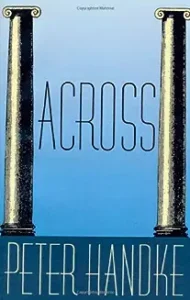Across by Peter Handke 1986
I had never heard of Handke when I came across this slim volume at Commonwealth Books, a great used and rare book store in downtown Boston. The blurb on the back sounded promising, and when I learned that Handke had received the Nobel Prize for Literature in 2022, I decided to read it.
The Nobel citation read, “for an influential work that with linguistic ingenuity has explored the periphery and specificity of human experience” but you could have fooled me. This book was a real slog, and it was only because of my expectation that it would get better that I persevered to the end.
The story is weird but the writing is even weirder. Andreas Loser, a teacher of classics and an amateur archeologist (a ‘tresholdologist’ who looks for what is missing, not what is there in various ruins), is out walking one night when he sees a man painting swastikas on trees. Loser picks up a stone and throws it, killing the stranger. He then goes on to his monthly card game after which he visits various places from his past. He is never caught and there is no follow up description of what happens.
The writing is very dense with disconnected descriptions of settings (Salzburg) and people. The actual murder occupies less than two pages while the rest of the book describes Loser’s mental state and his meanderings around Salzburg. The book was reviewed positively in the NYT in 1986 as follows: “Handke has an obsession with the way language defines and constricts human possibilities”. I agree, but didn’t find it engaging.
Handke was a controversial Nobel choice since he had been a persistent supporter of the Serbs in the Bosnian holocaust. Honored by Serbia, he has been shunned by much of the world. Acknowledged as one of the most important writers in German in recent times, I don’t plan to read any of his other work.



